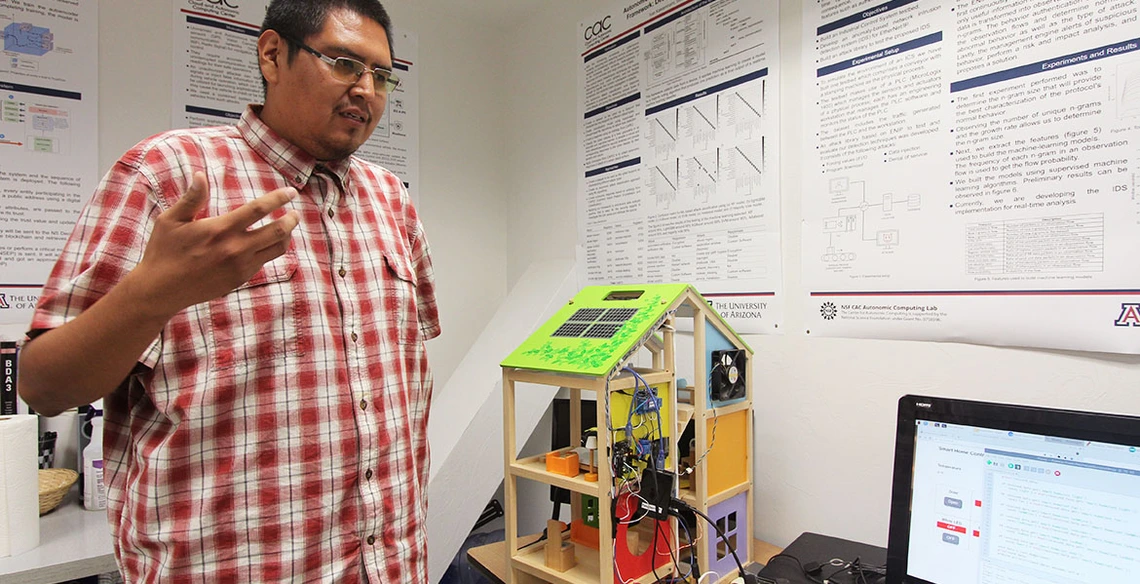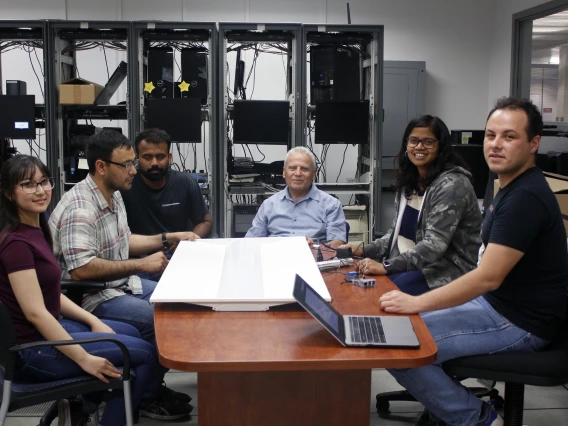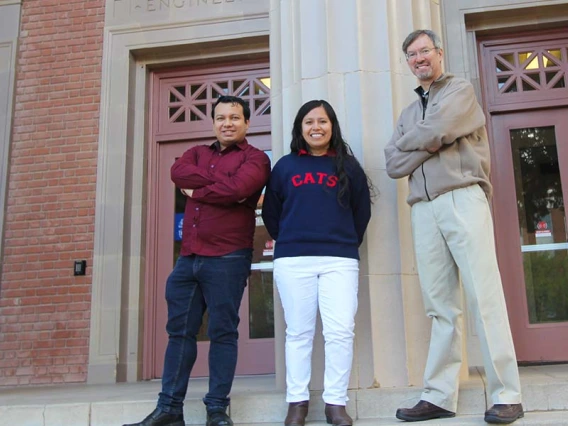Training Expands UA’s Cybersecurity Expertise to Minority-Serving Schools Across Nation
The hands-on PACT program provides research and leadership opportunities for undergrads and graduate students.

Steven Halwood, a student at Navajo Technical University, is working on a smart house research project as part of the Partnership for Proactive Cybersecurity Training summer program, which just completed its fourth year.
Steven Halwood, a student at Navajo Technical University, experienced many firsts at the University of Arizona during summer 2023 in the Partnership for Proactive Cybersecurity Training (PACT) program. For starters, he figured out how to do the coding to create two types of cyberattacks on a smart house, and subsequently how to prevent them.
“I had no idea how to launch any kind of attacks when I first got here,” said Halwood, a law enforcement student who plans to go to law school, then on to a career in Navajo tribal politics. “Now I can say I’m a novice or an intermediate hacker.”
Halwood’s NTU instructors urged him to participate in PACT for cybersecurity training when he was studying how to use technology, such as cell phone location records, to find missing persons.
NTU’s main location is in Crownpoint, New Mexico, and Halwood attends the campus in Chinle, Arizona. At the UA, the largest university he’s visited, Halwood encountered “a whole bunch of new faces and new cultures” and researched behavior analysis techniques to improve security for technology that uses Internet of Things, such as smart houses and autonomous vehicles. He produced a video detailing the findings that will be published on the PACT website and YouTube.
“I jumped into a new subject that will influence our futures,” said Halwood.
Two Ways to Learn
The PACT summer program is a partnership between the UA, Navajo Technical University and Howard University that’s funded by the Department of Energy National Nuclear Security Administration. Undergraduate students of the three universities gather at the UA for a summer-long research intensive.
PACT also offers an online cybersecurity certificate program for undergraduate and graduate students at all 56 schools in the DOE’s Minority Serving Institution Partnership Program. Since PACT began at the UA in fall 2019, 237 students have completed at least one aspect of the program, with many from the summer studies also completing the online course.
The most popular course so far, a spring 2023 certificate in machine learning, attracted 92 students. A course in penetration testing, which involves finding vulnerabilities in a system, was offered previously. Under development is a course in forensics, focused on determining how attacks happened, who is perpetrating them, and how the breaches can be prevented.
Both PACT offerings are free for students, and expenses for the summer program are covered. The programs serve double duty addressing national workforce shortages and research challenges. The UA is one of only a few universities in the nation providing hands-on cybersecurity training, said Salim Hariri, electrical and computer engineering professor and PACT principal investigator.
“We’re training the next generation of the cybersecurity workforce,” he said. “Our consortium is unique in that we do research, but the outcome is training for minority students across the United States.”
The summer program also prepares participants for graduate school, and almost every student has gone on to pursue advanced studies, said Hariri.
Mentors Learn to Lead
In the summer program, each student or team of students is paired with a mentor. The mentor role offers valuable training opportunities for doctoral students, many of whom become professors, said Hariri.
“The mentors are so proud of the students at the end,” he said. “It’s hard to believe they’re the same students who arrived on campus at the beginning of the summer.”
Halwood’s mentor is Clarisa Grijalva, an electrical and computer engineering doctoral student specializing in industrial control systems.
Grijalva first visited the UA in 2016 as part of a program that was similar to PACT. She was an undergrad at University of Sonora in Mexico and found the cybersecurity research eye-opening. Now, she enjoys helping PACT students navigate the experience.
“It’s pretty cool to pass on the knowledge that we have and show them that research is fun, and that it’s important to continue doing this kind of research,” she said.
Grijalva’s fellow ECE doctoral student Arminda Estrada served as a mentor last summer and is now the PACT coordinator. Both positions have prepared her for a cybersecurity career, she said. She has learned how to manage the program’s logistics, including accounting and registration, and helping resolve issues within teams or between students and mentors. She’s also networked with government leaders.
“I went to a DOE cyber conference and got insight into what issues we’re having right now as a country,” said Estrada, who is considering a career with the government.
“I would like to help make cybersecurity decisions and protect the nation from cyberattacks,” she said.



